The Book of Experimental Might by gradenko_2000
Introduction
Original SA post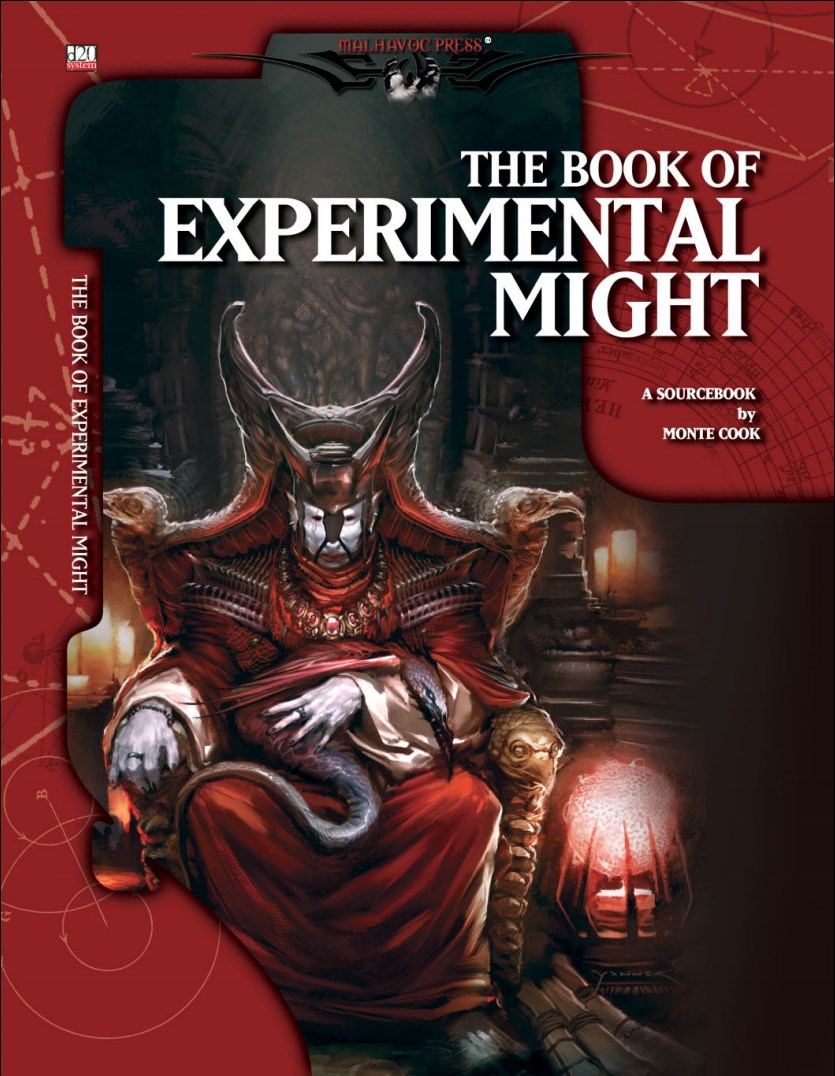
Introduction
The Book of Experimental Might is a sourcebook for D&D 3.5 written by Monte Cook, released in Feb 2008. It's largely a collection of houserules, and while it does cover Classes, Skills, Feats, Playing the Game and Magic, it's not a complete rewrite/replacement of the core PHB like Arcana Unearthed/Evolved.
In the introduction, the main thing Cook is pitching with this book is refactoring the entire spell system into a level 1 to 20 scale, mostly to eliminate the confusion between player levels going up to 20 but spell levels only ranging from 1 to 9.
He also mentions that since this book is more about a collection of houserules than a full-fledged game, it's going to be far more annotated about his design intent and reasoning for changes compared to previous works where he simply presented the rules "as-is" and let the players figure it out for themselves (a practice I believe he himself referred to as 'Ivory Tower Design').
There's also a bit in here where he talks about how he doesn't really like offering his own commentary on rules because "these notes become a self-aggrandizing opportunity to bash existing rules, and nobody wants that." He goes on to say that "It is not an indictment of the existing rules at all. There is no presumption here that these changes are better than the Core Rules."
It's somewhat of an intriguing statement to be made in context because in February of 2008, the marketing for D&D 4th Edition was going full steam. The "Wizards Presents" preview books were released in late 2007, and 4th Edition's core would hit the market just six months after Experimental Might. Maybe I'm reading a bit too much into this, but Cook may have been playing a coy game here when he's intentionally shying away from disparaging 3rd Edition the way Wizards of the Coast did as part of the transition from 3rd to 4th.
Spellcasting
The big thing about Experimental Might is, as I had mentioned, having the spells redistributed over 20 levels. If you have a level 4 Druid, you can cast level 1, 2, 3, and 4 spells. When you level up to 5, you can cast level 5. Much more intuitive, right? And the book hits the ground running by immediately giving us a chart to replace the core Spells By Level chart:
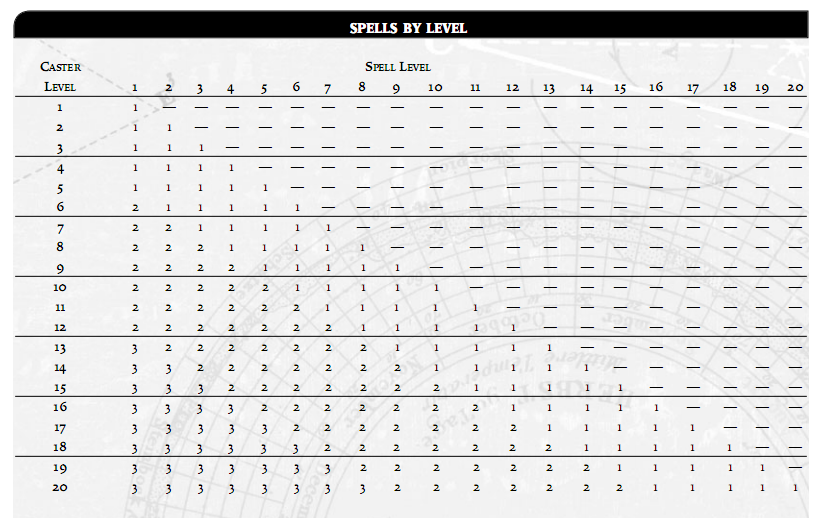
That chart looks like a mess, but luckily Monte Cook helpfully explains in a sidebar that spell conversions were mostly done by assigning the spell level either to the character level where you could normally learn it in the core rules, or one level later. So that means what's really happening is:
Core spell level 1 = Experimental levels 1 and 2
Core spell level 2 = Experimental levels 3 and 4
Core spell level 3 = Experimental levels 5 and 6
Core spell level 4 = Experimental levels 7 and 8
Core spell level 5 = Experimental levels 9 and 10
Core spell level 6 = Experimental levels 11 and 12
Core spell level 7 = Experimental levels 13 and 14
Core spell level 8 = Experimental levels 15 and 16
Core spell level 9 = Experimental levels 17 and 18
And yes, that pattern peters out by character/spell level 18, but we'll get into that later. For now, we can use this as a basis for comparing how this actually plays out in practical terms.
This is what the spell progression of a Druid/Wizard looks like in the core rules:
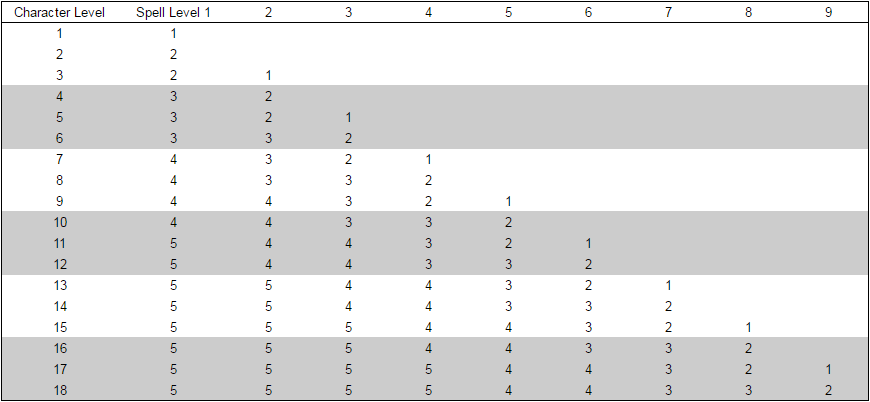
And this is what the spell progression of a Druid/Wizard looks like in Experimental Power, after we "reverse" the spell redistribution back into a 9-level range:
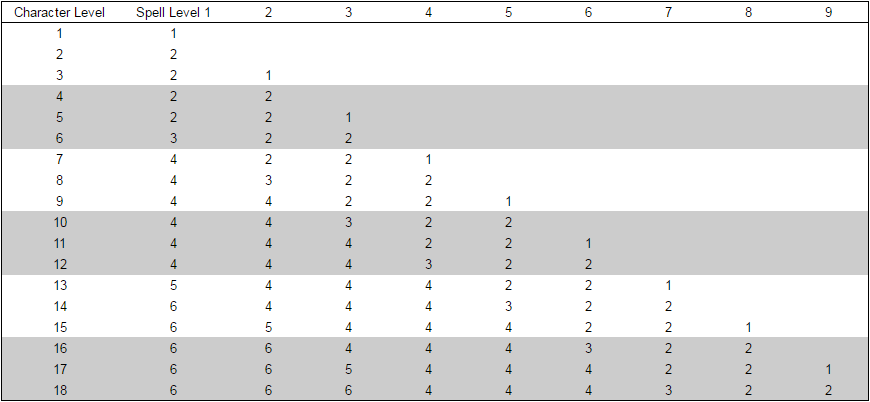
And from there we can see where the Druid/Wizard gains or loses ground:
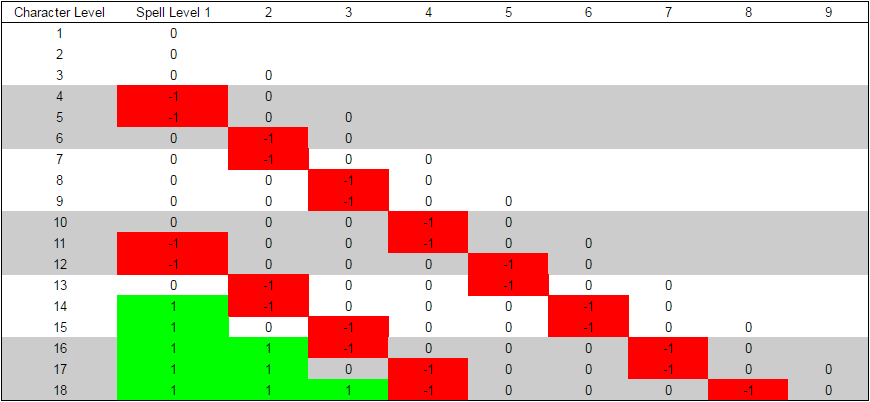
As you can see, the spell progression is exactly the same at the cutting edge, and then they're behind by maybe one spell slot at the duller edge.
But wait, there's another element to consider:
Monte Cook posted:
Clerics, druids, and wizards have a new spell level progression, based on the assumption that they can cast spells of level 1 to 20, rather than levels 1 to 9.
Bonus spells from high ability scores remain unchanged. That means a wizard with Intelligence 17 gains bonus spells of levels 1, 2, and 3, even though those levels represent very different spells in this alternate system. (This fact decreases the emphasis of high ability scores in the game.)
See, I don't buy this: the Wizard is still going to want to have an Intelligence of 19 so that they can cast level 9 (or level 20, as the case may be) spells!
But okay, let's just run with this. Bonus spells from high ability scores will add one spell slot each to every spell level, up to 9, right? If we leave that "as-is", but then reconvert them back into the 1 to 9 level range, that means that the character is gaining two extra spell slots for Core levels 1 through 4 (equivalent to Experimental levels 1 through 8), and then one extra spell slot for Core level 5 (equivalent to Experimental level 9), and then nothing more after that.
Taking all that into account, the comparison chart between a Core Wizard and an Experimental Wizard is going to look something like this:
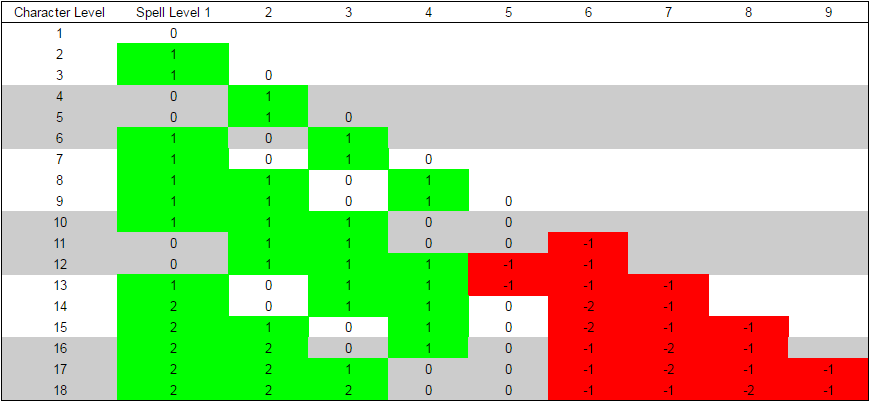
They'll have more spells outright for the first half of the game, and then will be one spell slot behind for the final half.
To round out the rest of the basic rules changes:
There are no level-0 spells
Spell learning requires an ability score of [10 + half spell level] so that you still only need 20 Intelligence to learn a max-level spell
Saving throw DCs are now [10 + spellcasting modifier + half spell level] or else your level "10" spells are going to have sky-high save DCs
Next: Class-specific changes
Disciplines
Original SA post
Disciplines
This is the big change to classes in Experimental Might. They're iconic spells and class abilities that were instead transplanted into a list of class abilities so that instead of all Druids gaining Animal Companion or all Clerics gaining Turn Undead, you have to specifically select that Discipline that gives it to you.
And since this is a Monte Cook work, it's important to mention as early as now that this is a spellcaster feature. Clerics, Druids, Wizards, Bards, Paladins and Rangers get "Disciplines", but nobody else (of the core classes do).
Anyway, each of these classes starts with one Discipline. On every even-numbered level, you have the option of taking a feat, or taking a new Discipline, or enhancing an existing Discipline.
The Disciplines themselves basically are "at-will powers", or "stances" as far as passive effects that need to be activated.
quote:
Important Sidebar:
Another rule change of Experimental Might is that all characters get one feat every level. This is why I'm saying classes can take feats or disciplines at even-numbered levels.
We're going to be doing a number of these asides and sidebars and jumps throughout the book, because many of these systems are interlocking. If it gets confusing, let me know and I'll try my best to clear it up as far as I understand it
Cleric Disciplines
Divine Inspiration lets you add a +1 bonus to either:
Attack and damage rolls
OR Saving throws, ability checks, and skill checks
OR AC
It takes a Standard Action to activate, and then lasts 1 round per level, which strikes me as annoying book-keeping when they could have just made it into a more passive effect. The bonus goes up by 1 every five levels, and then you can enhance it in the following ways:
Grant only half the bonus, but make it a free action to activate
Have the bonus apply to two of the three categories at the same time
Have the bonus apply to all three categories at the same time
quote:
The enhancements are gated by level, such as the free action enhancement can only be taken at level 4, and the all three categories enhancement can only be taken at level 14. I'm not going to go as deep into the details to mention all of the minimum level requirements, but I am writing them down in order.
The phraseology Cook uses here is "a free action that can be performed once each round", which strikes me as odd because Swift Actions were already invented by then. Is this a copyright/OGL/SRD issue?
Divine Senses is basically the Detect Magic spell turned into an at-will Discipline, provided you give up the feat for it. Enhancements include:
Letting your detection pierce through materials like stone, metal, dirt, etc.
The ability to read all magical writing
The ability to detect faint auras
The ability to detect enchantment auras
The ability to detect illusion auras
And then there's a bunch of rules about what constitutes a "faint" or a "strong" aura and how long a magical trace is left before becoming undetectable.
Godhammer grant you a +1 damage bonus to the first attack you make with your melee weapon, increasing by an additional +1 every three levels. You can enhance it to make it work with ranged weapons, and to make it work with all of your attacks within a round.
Turn Undead is Cook's rewrite of TU to make it more of a standardized ability. The undead target makes a Will save with DC [10 + half Cleric level + Charisma modifier], and on a failure becomes frightened so many rounds. You can enhance it by:
Making it deal damage
Increasing the range to Long
Making the effect immobilize the target rather than making it run away
Making it no longer provoke AOOs (seriously? a feat for that?)
+2 on the Will save DC
Remove the limitation on "cannot target an undead with more than 2 Hit Dice than you"
Can target Evil Outsiders on top of Undead
Can target Evil Divine Spellcasters on top of Undead
In the liner notes, Cook says that he had to make it only target one creature at a time because this new TU has "unlimited uses"
Debilitating Touch is an at-will touch attack that deals 1d6 negative energy damage + another 1d6 per three caster levels. There's also a Fort save or become Fatigued. You can enhance it by:
Making the effect Exhaustion rather than Fatigue
+3 on the Fort save DC
Add an additional 1d6 damage (but capped at no more than 1d6 per two caster levels)
Make it stun for one round on a failed Fort save, on top of everything else
Divine Presence
This is the big one, and I'll cap off this section with just this last Discipline and its implications for the rest of the system.
When the Cleric has this Discipline, the Cleric's allies can spend a Standard Action to touch them or any part of their clothing in order to receive healing equal to [1d6 + (1 per level)].
There is no limit to the amount of times this Discipline can be activated, but there is a limit of [1 + level + Charisma modifier] on the number of unique individuals that tap the Cleric for their healing. Cook explains that this is to prevent the potential Murphy of a single Cleric serving as a healing fount for an entire army. The idea is that if the Cleric has at least 12 CHA, then at level 1 they can heal up to three different people, which would be the three other people in the adventuring party.
Elsewhere in the book, it will be explained that there are no more "Cure X Wounds" spells. This is it.
You can take Enhancements to increase the healing amount by an extra d6, and it would appear that that's how you're supposed to keep up with the scaling: Cure Serious Wounds or whatever would mean taking the More Healing enhancement multiple times.
Cook then says that redesigning healing in this fashion causes two things to happen:
1. The Cleric no longer has to spend spell slots on healing spells
2. The Cleric no longer has to spend actions to heal their comrades
Remember what I said about this book coming out on the tail-end of 3rd Edition's lifecycle and during the run-up to 4th? Now, I don't know how much of the gaming world knew of 4th Edition's design by then, but this strikes me as Cook's own take on the "Healing spells are Minor Actions" design of 4e's leaders. Cook even says:
quote:
The cleric can cast whatever spells he wishes or bash people with his mace all day long and not even pay attention as his friends use his presence to heal themselves.
Except that's still not great, because now you're shifting the burden to the other people to spend their actions to heal themselves, since it's a Standard Action to activate, and you need to be within melee range of the Cleric. Maybe that last part is an interesting tactical consideration, but eh.
There is one last Discipline, called Healing Touch, which is the Cleric-proactive version. The Cleric touches someone at the cost of a Standard Action to themselves, and then the target gets healed for [1d8 + (1 per level)]. Like Divine Presence, you can take Enhancements to add extra d8s to the healing, an enhancement to make it not provoke AOOs (again? seriously?), and then an enhancement (at level 8!) to make into a close-range spell rather than a melee touch.
For this one, you are giving up your Standard Action to heal people, but at least it doesn't cost you spell slots.
Now, any astute player of 3e is going to spot the huge loophole in these abilities from a mile away: you finish an encounter, you touch the Cleric a bunch of times, you heal to full, you keep going. Free infinite healing, right?
So lets zoom forward to the Playing the Game chapter, with the other interlocking rules change brought by Experimental Might.
quote:
Magical Healing
Characters can only receive magical healing a number of times in a given day equal to their level + their Constitution modifier, with a minimum of 2. The term “magical healing” means any application of curative magic, from a potion, to a special ability, to the disciplines described in Chapter One: Classes.
Note that it’s incumbent upon healed characters to keep track of how many applications of magical healing they receive each day; this bookkeeping is not the healer’s responsibility.
And this is per application, mind you, so it actually behooves you to hit yourself with the strongest healing possible instead of just a Cure Light Wounds, because a single cast of CLW eats at your healing limit just as much as a Heal spell does (spoiler alert: the Heal spell has been removed from this game)
Remember what I said about this book coming out on the tail-end of 3rd Edition's lifecycle and during the run-up to 4th? Yeah.
Druid Disciplines
Original SA post
Druid Disciplines
First off, Druids have access to the Healing Touch discipline, but not the Divine Presence discipline, so they're not as good at healing as Clerics. Insert WoW joke here.
They also have access to the Magic Senses discipline, which is the same as Divine Senses, just renamed. They also have access to the Debilitating Touch discipline, which is the same as the Cleric version.
They start the game with the Animal Companion discipline for free, and then they gain the Nature's Affinity discipline for free at level 2.
Animal Companion is the same as in the core rules, except you need to spend Enhancements to buy the Ability Score Boost (which can be taken multiple times for +2 to Strength, Constitution and Dexterity per shot) and the Evasion ability.
You can also buy DR 5/silver and Spell Resistance [11 + Druid level], and the ability to have a second and a third companion.
For that last one, was that possible in the core rules? Because good lord that sounds impressively broken.
The Nature's Affinity discipline gives the Druid:
+2 to Knowledge (Nature) and Survival checks
+4 save bonus against fey abilities
the ability to use "Diplomacy" checks against animals using [d20 + Druid level + Charisma modifier]
The Woodland Stride ability needs to be bought as an Enhancement. Other enhancements include:
+2 to the Diplomacy checks against animals (seriously? a feat for this?)
the ability to use the Mending spell against organic materials
the ability to speak with animals
the ability to speak with plants
immunity to poison
Resistance 10 to cold, electricity, and fire
That just leaves one more Discipline: Wild Shape. The version here in Experimental Might is a lot more powerful than in the core rules since there's no limit to how many times a Druid can shift into and out of their shape - the only limit is that after they choose an animal form and shift into it, that's the only form they can assume for the rest of the day. There's also no limit on the duration of the shapeshift.
Enhancements for Wild Shape include:
the ability to speak, cast spells, and use disciplines normally while shapeshifted (at level 4!)
the ability to take on a second different animal form in the same day
the ability to shapeshift into Large and Tiny creatures
the ability to shapeshift into plant creatures
the ability to use the Alter Self spell at-will
the ability to shapeshift into Elementals
the ability to shapeshift into Huge creatures
I think you're getting the gist of this whole Discipline thing: it removes some of the class features that spellcaster classes have, and then you have to "buy them back" with feat slots, which you're going to have a lot of since you now gain a feat every level. Even if you were using all your even-level feats to buy Disciplines and Enhancements, and only the odd-level feats for actual feats, it wouldn't take long for you to still have more feats than you'd otherwise have in a normal game.
With regards to the Druid, it's a lot more powerful to be sure, but at the same time I can't help but feel like the Wild Shape discipline is pretty much bang-on in terms of availability and usability. Yes, it's still a hassle to draw upon the Monster Manual for your stats and abilities, but at least you can just turn into a tiger or something and just stay there forever. I played a Druid a lot in WoW and it always threw me off how gated and limited and circumstantial the D&D Wild Shape ability was.
Wizard Disciplines
Original SA post
Wizard Disciplines
The Wizard starts with the Arcanist discipline, which is like the Divine Senses and Magic Senses disciplines for the Cleric and Druid, respectively. The difference is that Arcanist also lets the Wizard use Arcane Mark at will.
They also have access to the Debilitating Touch discipline, same as the Cleric and Druid.
The other disciplines are:
Eldritch Bolt lets the Wizard make a 1d6 (plus 1d6 per three levels) force damage, ranged touch attack, with a Standard Action. Enhancements include:
A +2 bonus to the ranged touch attack roll
Increasing the range to Long
Making the ability not provoke an AOO
Allowing the bolt to deal energy damage rather than force damage
Adding another 1d6 damage (and this Enhancement can be taken multiple times)
Turning the attack into a Free Action, but at half damage, half range and a -4 attack roll penalty
Bolt of Bedevilment lets the Wizard daze a living target for 1 round + 1 per three levels if the target fails a Will save. Enhancements include:
Making the effect a Fascinate effect rather than a Daze effect, which lets the Wizard maintain the Fascinate with Concentration
Increasing the range to Medium
Making the ability not provoke an AOO
A +2 bonus to the Will save DC
Removing the Hit Dice limit (normally the target cannot have more than 2 HD than the Wizard)
Allowing the Bolt to target [1 + 1 per two levels] additional targets
Making the effect a Stun effect rather than a Daze effect
Increasing the duration to 1 round + 1 per two levels
This discipline seems fairly powerful, as it gives the Wizard a veritable at-will "save-or-suck" effect that puts them ahead of the action economy by as early as level 3. And it frees the Wizard from having to commit spells that target the Will save.
The Gifts of Magic discipline is basically at-will Prestidigitation, with an enhancement to also make it into at-will Mending.
Shield of the Seraphim is an at-will Mage Armor - the Wizard gets a +2 AC bonus, and another +1 per four levels. They can enhance it to increase the AC bonus further, to make it apply DR 2/magic, to make it apply 10 resist to an energy type of their choice (can be taken multiple times for more types), to make the AC bonus apply to one other target, or to change the bonus type from Armor to Insight (ostensibly to allow it to stack with other spells and effects)
Telekinesis is the core Telekinesis spell, but can be cast at-will. Enhancements include:
Turning it into the Unseen Servant spell instead
Making the ability not provoke an AOO
Making the ability precise enough to allow for fine motor movements with one hand, such as tying knots or writing with a quill
Increasing the range to Medium
Making the ability able to affect creatures as well as objects
Increasing the weight limit to 200 lbs
Making the ability capable of hurling objects as ranged improvised weapon attacks
Making the ability precise enough to allow for fine motor movements with two hands
Increasing the weight limit further to 500 lbs
Telepathy is what it says on the tin. It lets you mentally talk to any one single intelligent creature within 100 feet of you, with a Will save for the unwilling to resist. Enhancements include being able to expand this to a network of 1 additional creature per level, making it independent of any language barriers, making it work over 100 miles, and making it work with unlimited, inter-planar range.
The last discipline is the big one: Familiars
Cook has a sidebar to explain his design - he wanted to give the option for Wizards to NOT have familiars (you just don't take this discipline), and then he calls out how most people tend to forget that their Familiars are a thing and they keep doing things that would have otherwise caused their Familiar to die, or the table forgets to check on the Familiar altogether. Citing Philip Pullman's His Dark Materials as his inspiration, he recasts Familiars into this mental angel on your shoulder that you can call upon as a sort on intelligent notebook.
quote:
A familiar is an extension of your own soul given a quasi-real substance in the world. Often, your familiar is not visible to the other characters—it is little more than a voice in your head, keeping you company (after a fashion) and helping you remember things you might otherwise forget. As such, taking an extra round to consult your familiar grants you a +1 bonus to any Intelligence-based skill check.
You can take a Standard Action to make it manifest into a Tiny animal, but since it is only a mental construct, it's still not "real" in this form and so cannot be attacked or shot with a spell or otherwise physically interacted with. While in this manifested form, the Wizard gets a +2 to Spot and Listen checks because the Familiar is watching out for them.
quote:
A familiar that you ignore even for a moment stops manifesting. Mainly, this occurrence is up to the DM’s discretion. A player cannot say, “I keep my familiar manifested all the time,” because no one can maintain that kind of concentration and hope to accomplish anything else. As a rule of thumb, assume that if you manifest your familiar, it remains for 10 rounds or the duration of an encounter,whichever is longer. The familiar of a sleeping, stunned, or unconscious wizard always stops manifesting.
Enhancements include:
Letting the familiar move independently of the Wizard, at a rate of 5 feet max distance per level, so that the familiar can scout ahead.
Letting the familiar mentally speak to the Wizard (this is specifically mentioned as being a separate thing you have to buy from letting the familiar move away from you, so without this your familiar has to make the trip back to report its findings)
Making the familiar take on the appearance of an angel for a Good Wizard, or a devil for an Evil Wizard. This also increases the save DC of all your spells by +1 as long as the familiar is manifested and you're casting it against an opposite-alignment target
Making the familiar an extraplanar creature, giving the Wizard another +2 bonus to Intelligence-based skill checks because of its otherwordly wisdom
Making the familiar into an elemental. It's still a Tiny non-interactable creature, but once a day for 1 round per level, it can turn into a Medium-sized elemental that can fight. If it's slain in this form, the familiar becomes dormant for 24 hours and the Wizard loses all benefits
Making the familiar take on the appearance of an imp for a Lawful Wizard, or a quasit for a Chaotic Wizard. Like the elemental form, the Wizard can also make the familiar fight as an imp/quasit once per day
Making the familiar into a Large elemental
Letting the familiar move independently of the Wizard even farther, at a rate of 50 feet max distance per level
Making the familiar into a Greater elemental
Making the familiar into an Elder elemental
I actually like this last bit about familiars. I could never really use them well even in the days of Neverwinter Nights on the PC, and on paper they always seemed to be a bunch of frivolous book-keeping. This method seems a lot more practical, and if you are the kind of person who can make good use of a separate familiar, then it's a daily power and you can play it off like a Warcraft Archmage summoning their Water Elemental.
Paladin Disciplines
Paladins lose all spellcasting, and Lay on Hands, and Turn Undead.
They do have access to the following previously discussed disciplines:
Divine Inspiration
Divine Presence
Healing Touch (access to both means they can be as good at healing as Clerics, insert WoW joke here)
Godhammer
Turn Undead
Specific to Paladins are:
Holy Aura is basically an at-will, personal Shield of Faith, as the Paladin gains +1 Deflection bonus to AC, plus another +1 per five levels. It can be enhanced to increase the AC bonus, to make it apply DR 2/magic, to make it apply 10 resist to an energy type of their choice (can be taken multiple times for more types), and to make the AC bonus apply to one other target.
Holy Weapon makes every weapon held by the Paladin to be considered a Good weapon. It can be enhanced to cause all crits against Evil targets to be automatically confirmed, and to also make every weapon automatically considered a Holy weapon.
Ranger Disciplines
Rangers lose all spellcasting, and Animal Companion, and Woodland Stride
They do have access to the Animal Companion, Nature's Affinity, and Nature's Senses disciplines, which are identical to the Druid versions.
Specific to Rangers are:
Nature's Movement, which gives Rangers a +10 bonus to speed, with another +10 per five levels, and adds a bonus to Balance, Climb and Jump skill checks equal to half the Ranger's level, and it can be enhanced to let the Ranger walk on water.
Nature's Protection, which gives Rangers a +1 natural armor bonus to AC, with another +1 per five levels. It can be enhanced to add a bonus to Sneak skill checks equal to half the Ranger's level while in natural surroundings, as well as an enhancement to add Resistance 10 to Cold, Electricity and Fire.
Sidebar posted:
Another core change to the rules is that Hide and Move Silently have been merged into a single skill - Sneak
Bards and Sorcerers
Bards don't gain disciplines, and instead keep all their core class abilities, but with their spell progression refactored into the 20-level model. Unfortunately, Cook doesn't provide a new spell-list to go with it, so you have to do the conversion yourself. Cook also recommends instead using the variant Bard that he wrote in The Book of Eldritch Might 2, which uses a system called Spellsongs to replace spellcasting.
As for Sorcerers, well:
quote:
Sorcerers likely prove unnecessary to your game with the new rules provided in this book—giving wizards disciplines makes them more like sorcerers. If you still want to have sorcerers in your campaign, however, offer them the wizard spell list presented in Chapter Five:Magic.
So yeah, do away with them entirely. This doesn't seem entirely out-of-line or lazy considering that most people already considered Sorcerers to be redundant even in core 3e anyway, as in "why would you want to play a Wizard with worse spell progression and selection?"
But what about the Barbarian, the Fighter, the Monk and the Rogue? Cook would later write a second Book of Experimental Might, covering options for these classes.
Next, a new class entirely - the Runeblade